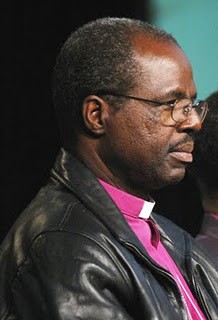Bishop to Episcopal Church: Don’t bow down to homophobes
Colin Stewart is a 45-year journalism veteran. He is the…

Here’s the problem:
The Episcopal Church admires the work of Bishop Christopher Senyonjo of Uganda and others like him who serve beleaguered LGBT people in many of the 76 countries where homosexuality is illegal.
But as part of the worldwide Anglican Communion of churches, the U.S.-based Episcopal Church won’t provide financial support to gay-friendly programs such as Senyonjo’s St. Paul’s Center without approval from their country’s Anglican Church.
In Uganda and many other countries, the Anglican Church would rather imprison lesbian, gay, bisexual and transgender people than serve them, yet the Episcopal Church continues to provide those churches with financial support.
Those policies are backwards and should be changed, Senyonjo today told the World Mission Committee of the Episcopal Church’s week-long General Convention, which is getting under way in Indianapolis, Indiana.
“The prophetic leadership of the Episcopal Church is needed more than ever in the global south, where LGBT-inclusive programs need moral and financial support,” Senyonjo said.
The Rev. Canon Albert Ogle, president of the St. Paul’s Foundation for International Reconciliation, which supports Senyonjo’s work, said:
“While Episcopal churches send millions of dollars each year to Archbishops and Provinces who are actively supporting the further criminalization of LGBT people in Africa and the Caribbean, the Episcopal Church’s key funding organizations are inhibited by our own policy of supporting heroic efforts by in-country organizations like Bishop Christopher’s St. Paul’s Center, which is a model gay/straight alliance.
“We need to expand our mission to include churches and organizations who share our values of inclusion and reconciliation. There is an inadvertent inconsistency between what Episcopalians ‘say and do’ domestically on LGBT inclusion and who we fund internationally.”
Even though Senyonjo’s ministry of inclusion is consistent with the Episcopal Church’s teaching and practice, Ogle said, the bishop has been unable to secure funding from any of the church’s key mission resources, including Episcopal Relief and Development, the

United Thank Offering and endowed parishes like Trinity Church, Wall Street. The reason for this funding freeze is because of a policy that requires the Archbishop and Province to approve any grant application from their region, Ogle said.
Senyonjo, 80, was inhibited by the Anglican Church of Uganda and stripped of his pension and rights to exercise his ministry because of his inclusive welcome of LGBT people in his chapel at the St Paul’s Reconciliation and Equality Center and his defense of their Constitutional rights, Ogle said.

Recently the Church of Uganda’s archbishop, Henry Luke Orombi, led the Ugandan Joint Christian Council in calling on the Ugandan parliament to pass the controversial Anti-Homosexuality Bill, which would tighten the country’s already-severe laws against homosexual activities. That bill is known as the “Kill the Gays” bill because of a provision, which may have been dropped, calling for the death penalty for repeat offenders. The bill would sentence LGBT people to life imprisonment for “aggravated homosexuality” and require parents and neighbors to report known homosexuals or be fined or imprisoned.
Senyonjo said that, considering such political and theological differences, the Episcopal Church should revise its policies to ensure that, in Provinces that support criminalization and persecution of LGBT people, Episcopal Church resources will be directed to other churches and in-country non-government organizations providing pastoral care, support, education and advocacy for oppressed people.
Senyonjo is spending four days at the Episcopal Church’s General Convention as a guest of the St. Paul’s Foundation, Oasis California, the Diocese of California and the Chicago Consultation.

The bishop, who was recently honored as Grand Marshal of the San Francisco Pride Parade, is en route to Washington, D.C., for the International AIDS Conference where he will be joined by 26 representatives of countries where it is currently illegal to be LGBT and often to receive HIV prevention and health services. As part of a Spirit of 76 Worldwide initiative of the St. Paul’s Foundation, Senyonjo and the other “authentic witnesses” will share their stories with legislators, the Washington faith community and the American public.
The Spirit of 76 Worldwide initiative is supported by the Ford Foundation, Open Society Institute, USAID, private donations, and some parishes, dioceses and denominations in United States.
Senyonjo’s St. Paul’s Reconciliation and Equality Center, which has nine full-time employees, is supported by the St. Paul’s Foundation.
Ogle urged the Convention to update its polices and direct Episcopal Relief and Development, United Thank Offering and endowed churches to expand opportunities for new mission partnerships.
In countries where the Anglican Church actively advocates for LGBT criminalization, Ogle said, the Episcopal Church needs to work collaboratively with established grassroots organizations and coalitions working for human rights.
“We cannot fully engage in 21st century mission when our church polity and financial models are based on 20th century models of relating. Globalization has made us one family,” he said.
Related articles
- Tough life, spiritual rewards for gay-friendly Kenyan priests (76crimes.com)
- Uganda’s Archbishop Orombi’s Retirement Hailed (kiwianglo.wordpress.com)
- Uganda’s new archbishop is homophobic, maybe less harsh (76crimes.com)
- Episcopal Church leaders set to consider blessing rite for same-sex couples (sacbee.com)


